EdgeTheory tracked narratives from FMI, identifying Russia-aligned sources comprising the majority of amplifiers on Arctic topics. FMIs are defined as sources, accounts, or individuals promoting narratives online that align with malign goals of foreign entities, primarily aligned with Russian, Chinese, or Iranian interests. By compiling thousands of articles, EdgeTheory analytic tools identified these primary influence strategies from prominent FMIs:
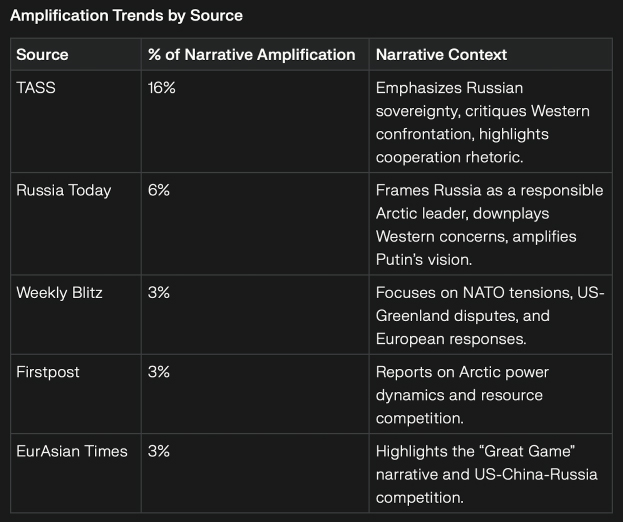
Aggregate NARINT strategies from most amplified FMIs
TASS and Russia Today serve as central engines of Russian narrative strategy, both generating original content and republishing aligned sources to reinforce perceptions of Russian legitimacy and Western hostility. Their high amplification rates reflect a coordinated effort to shape global opinion and influence policy discourse.
These narratives permeate both Russia-based narratives and correlate to strategies employed by other sources aligned with Russian interests.
FMIs, led by Russia Today and TASS, frame Russia as committed to sustainable Arctic development, emphasizing sovereignty, resource stewardship, and international cooperation-while portraying US and NATO activities as provocative and destabilizing. The intent is to legitimize Russia’s actions and cast Western involvement as illegitimate or threatening.
Russia amplifies its interests by amplifying the Greenland independence controversy. EdgeTheory briefs identified both Moscow and Copenhagen as narrative hubs for items discussing the Arctic.

Screenshot for EdgeTheory Briefs on the Arctic with narrative sources (yellow) and targets (red)
However, Russian sources tend to sidestep NATO concerns such as dual-use infrastructure and resource extraction rather than directly addressing them, indicating a persistent source bias in their unwillingness to present issues challenging Russian dominance. EdgeTheory briefs indicate this strategy was particularly present in Russian sources discussing the Arctic Council, likely in an attempt to portray Russia as apolitical, thus increasing its geopolitical capital to improve investment and expansion opportunities.

EdgeTheory brief on the Arctic Council annotated to highlight FMI tactics
Russia further amplifies its messaging by providing analysis that purports to be balanced. This article from Arctic Today presents a balanced analysis of VP Vance’s claims regarding the strategic importance of the Arctic, but focuses on criticizing the Trump administration’s tone.
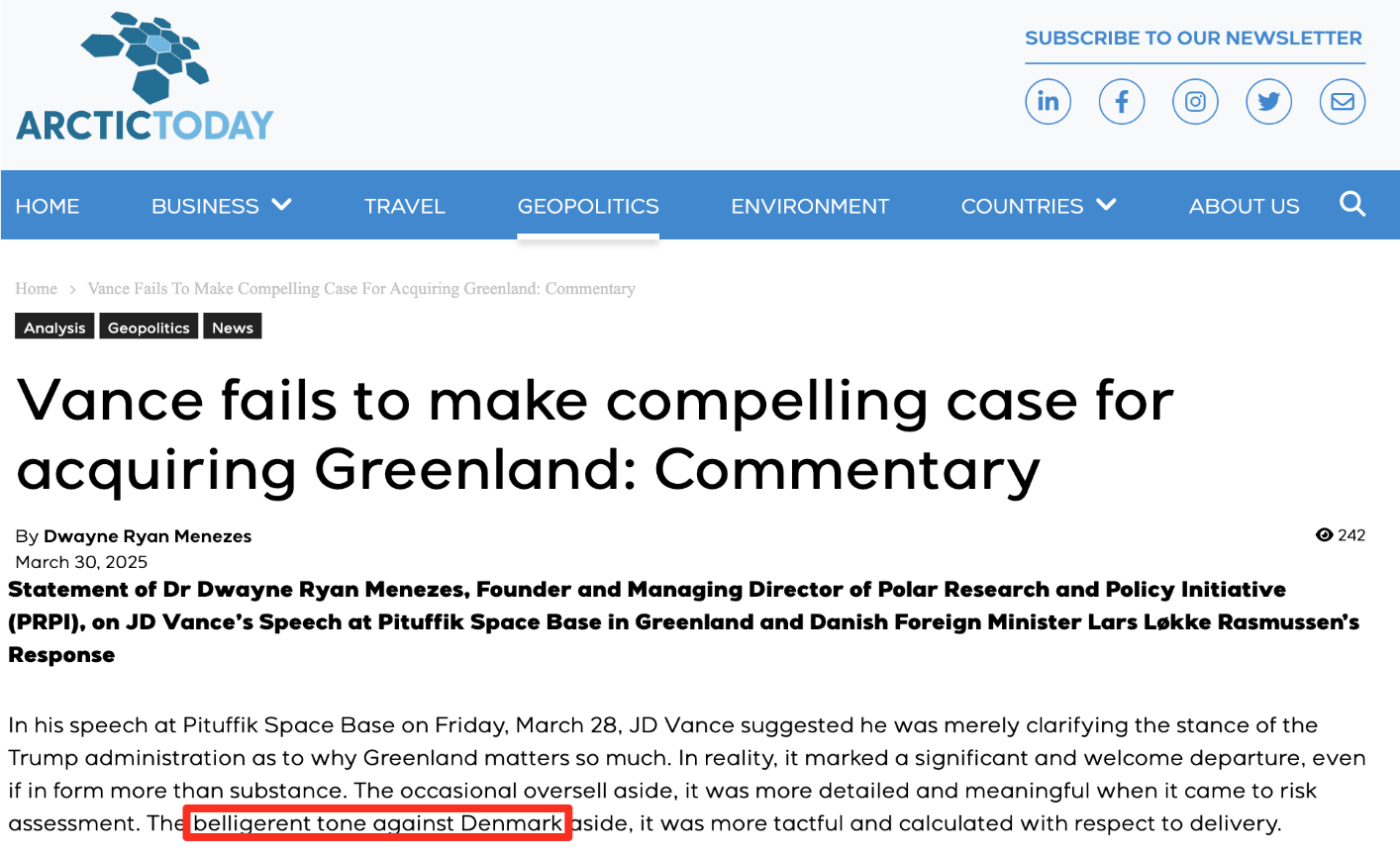
Article promoting FMI perspective
This emphasis is particularly effective in promoting shared interests with China because it draws attention to the Trump administration’s processes of engaging in diplomacy and away from their policies, policies that threaten to increase Arctic deterrence against expanding Russian interests.
Russian interests are thus portrayed by FMI as carefully taking into account multinational interests, international governance, and environmental protection.
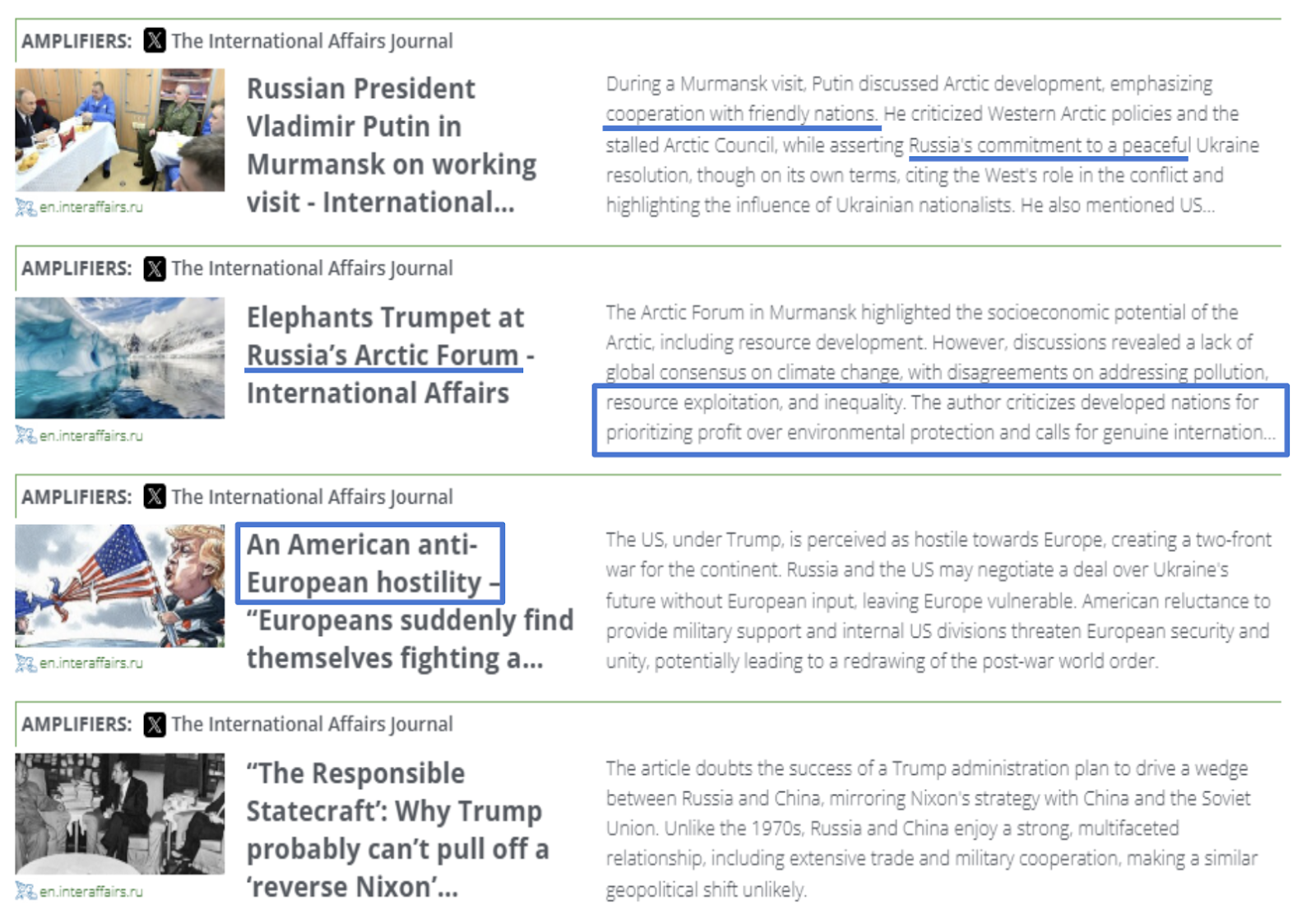
EdgeTheory brief Top Items annotated to show Russian narrative strategy
This posturing allows Russian narratives to attack the US for promoting divisions in NATO, particularly with the effect of amplifying a potential hot conflict between NATO allies.
A recurring FMI theme is the portrayal of the US and NATO as aggressively seeking Arctic dominance, particularly over resources and shipping routes. These narratives claim that Western militarization and policy shifts risk escalating tensions and undermining regional cooperation, with Greenland frequently cited as a flashpoint.
Top Items from EdgeTheory briefs indicate FMI emphasize US tactics as mercantilist and taking advantage of allies. Filtering Top Items by amplifications indicates Russia heavily prioritizes the perception of industrial advancement, likely due to ongoing sanctions from the war in Ukraine and Russia’s need to diversify supply chains. Russia thus emphasizes both its military (RT, top left) and industrial (RT, top right) dominance. FMI sources also tie these narratives to a general condemnation of US defense spending on Ukraine, calling it “money down the drain”
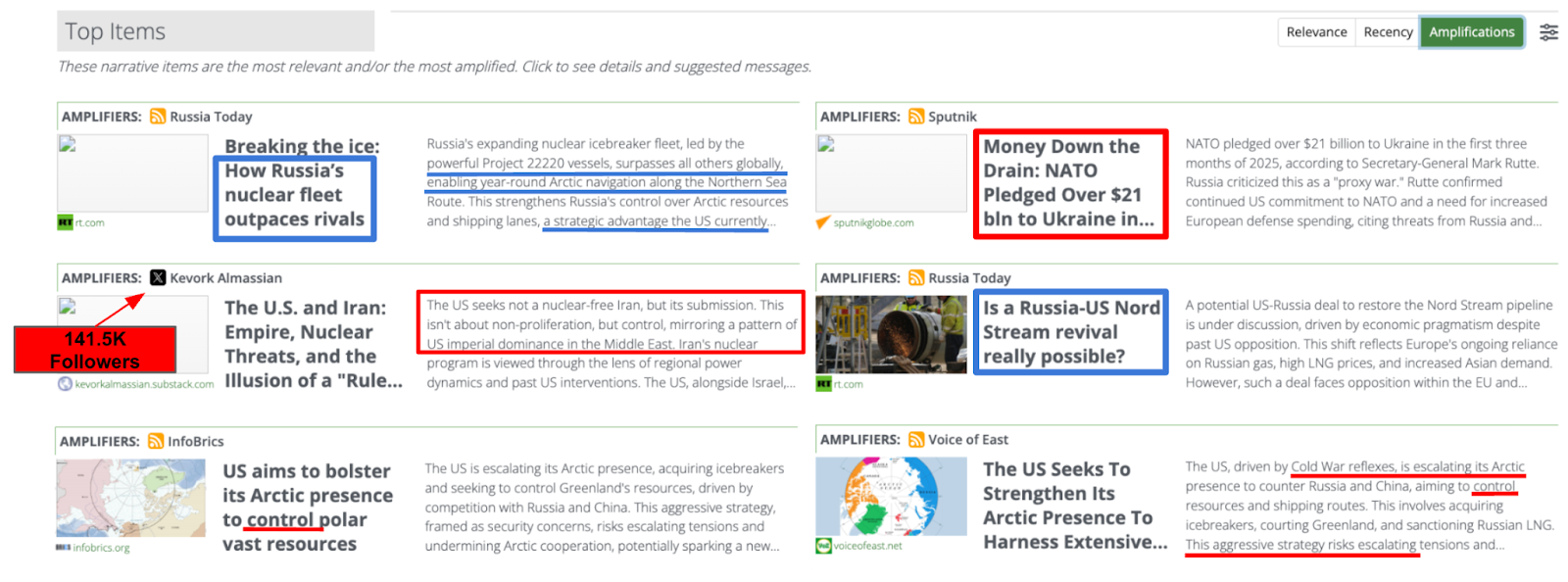
EdgeTheory Top Items filtered by most amplified stories, with pro-Russia narratives indicated in blue and anti-NATO in red
These narratives are amplified through state-run Russian media that portray the US as creating conflict within NATO with the potential for a hot conflict.
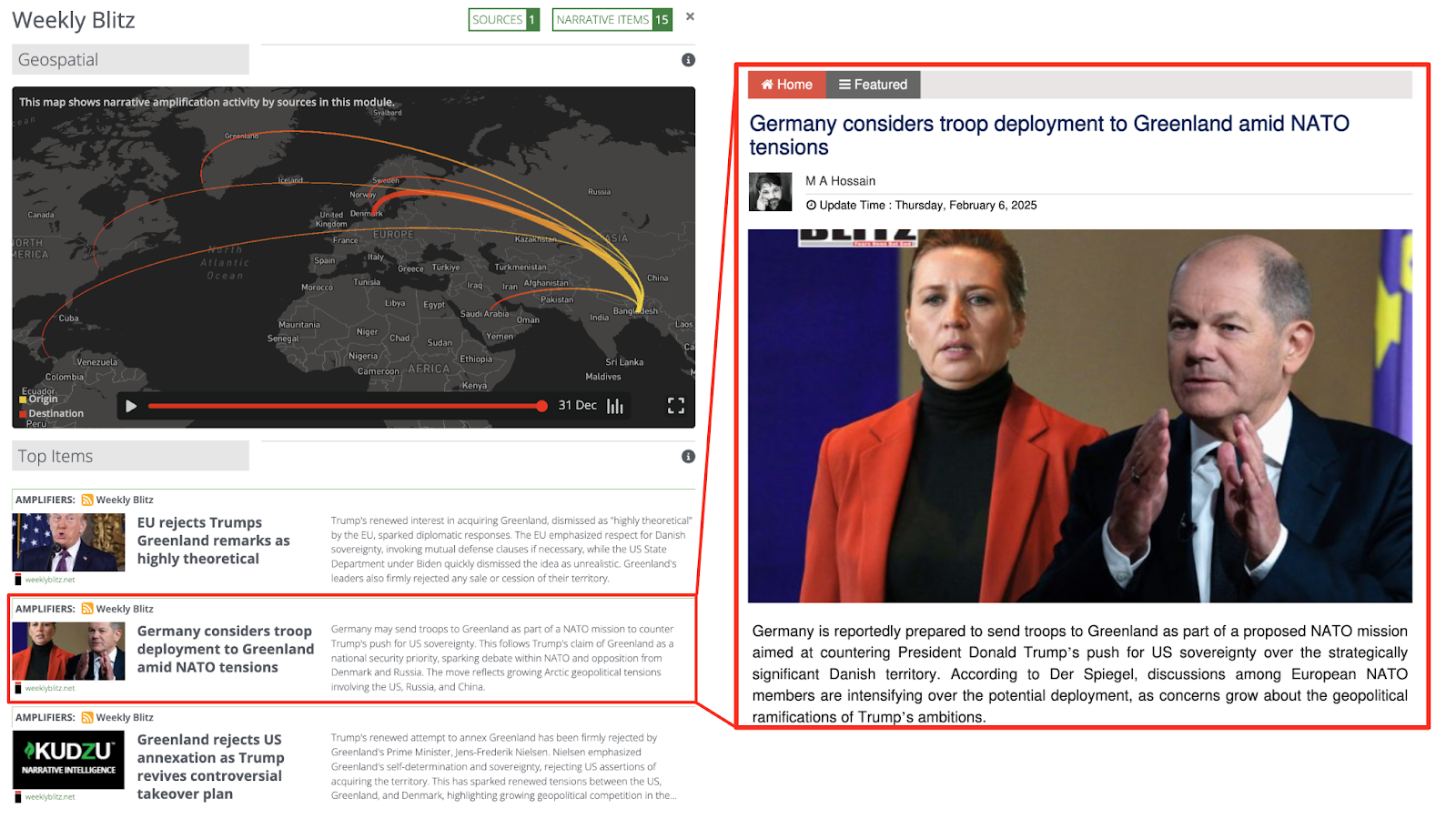
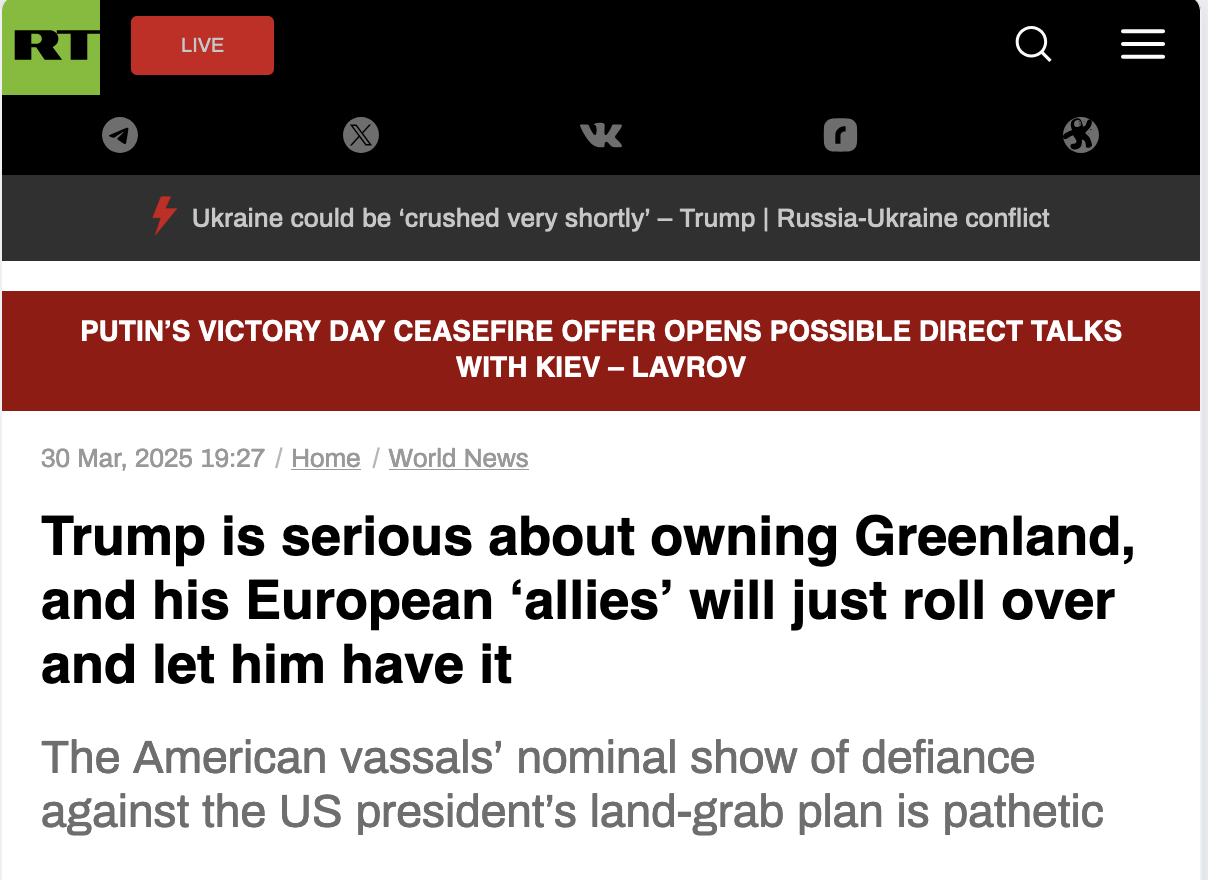
This article portrays the U.S. as obsessive and wanting Denmark to simply hand over Greenland because it is an obedient ally. It describes Russia as arguing for Greenland to be its own independent country. The article further states that Russia would want Greenland to be subject to bilateral agreements with it or China without intervention from the US or NATO allies.

RT article promoting the potential for US military force to take Greenland

RT X post emphasizing Greenland independence and the desirability of investments with China
By emphasizing the potential for the US to use military force against NATO allies, Russia amplifies the incentives to engage with the purportedly “stable” Russian or Chinese economies and investors.
State-run outlets by no means have small audiences.

RT profile on X with follower count annotated
Russian FMI make up the majority of malign influencers targeting the Arctic, although narratives continue to distinctly promote Chinese interests alongside Russian perspectives.

Source alignment attribution from EdgeTheory briefs
Attacking US intentions creates the opportunity for China to operate as a sympathetic and, if admittedly imperfect, a viable alternative to the US “bully.” Sources like Modern Diplomacy purport to host diverse viewpoints but in reality often end up promoting narrow interests.
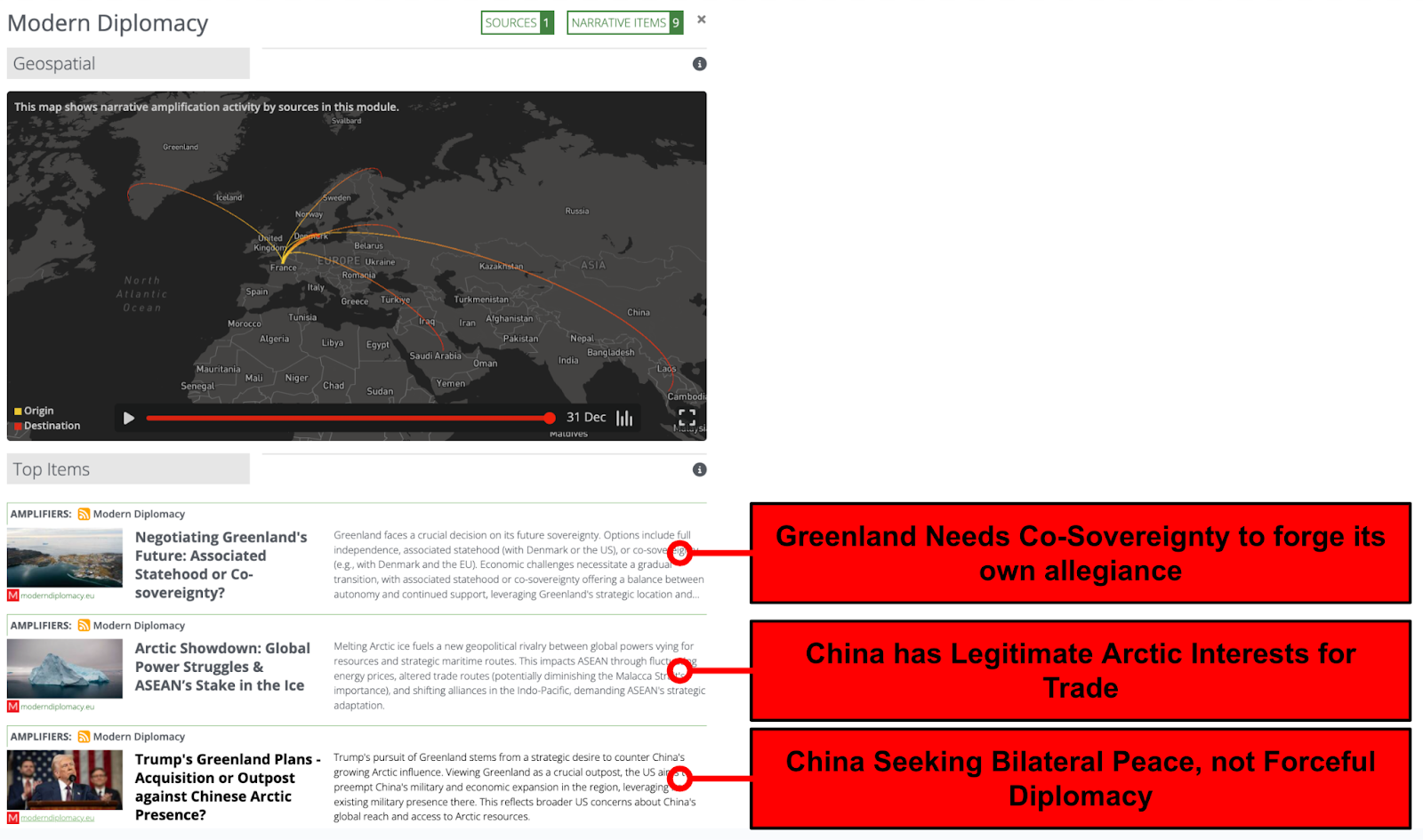
Annotated screenshot from EdgeTheory brief geospatial analysis and Top Items from source: Modern Diplomacy
By promoting Greenland's sovereignty, Russia aids in Chinese efforts to entrench economically in the territory before any largescale changes in authority are made that could intercept Chinese attempts to incorporate technology or industries that aid in CCP military or intelligence purposes.
FMIs leverage environmental and indigenous rights narratives to criticize Western involvement, accusing the US and allies of hypocrisy and disruption. These stories suggest that Western resource extraction and military activities threaten fragile ecosystems and indigenous communities, positioning Russian efforts as more responsible.
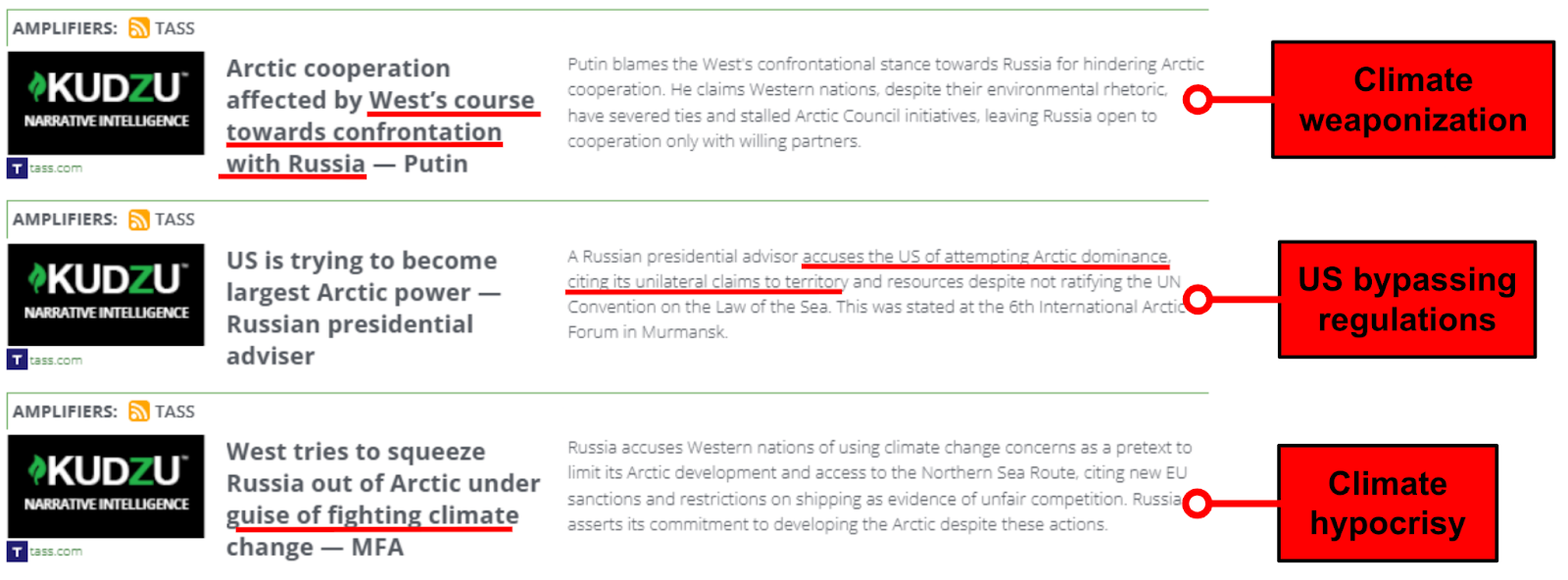
Top Items with annotated FMI narrative strategies
These themes are part of a longstanding Russian narrative campaign to discredit US policies and promote bilateral agreements between Russia and Western countries potentially disengaging from the US. Canada has been particularly targeted in the past, and is now in the crosshairs again due to tension over tariffs with the US.
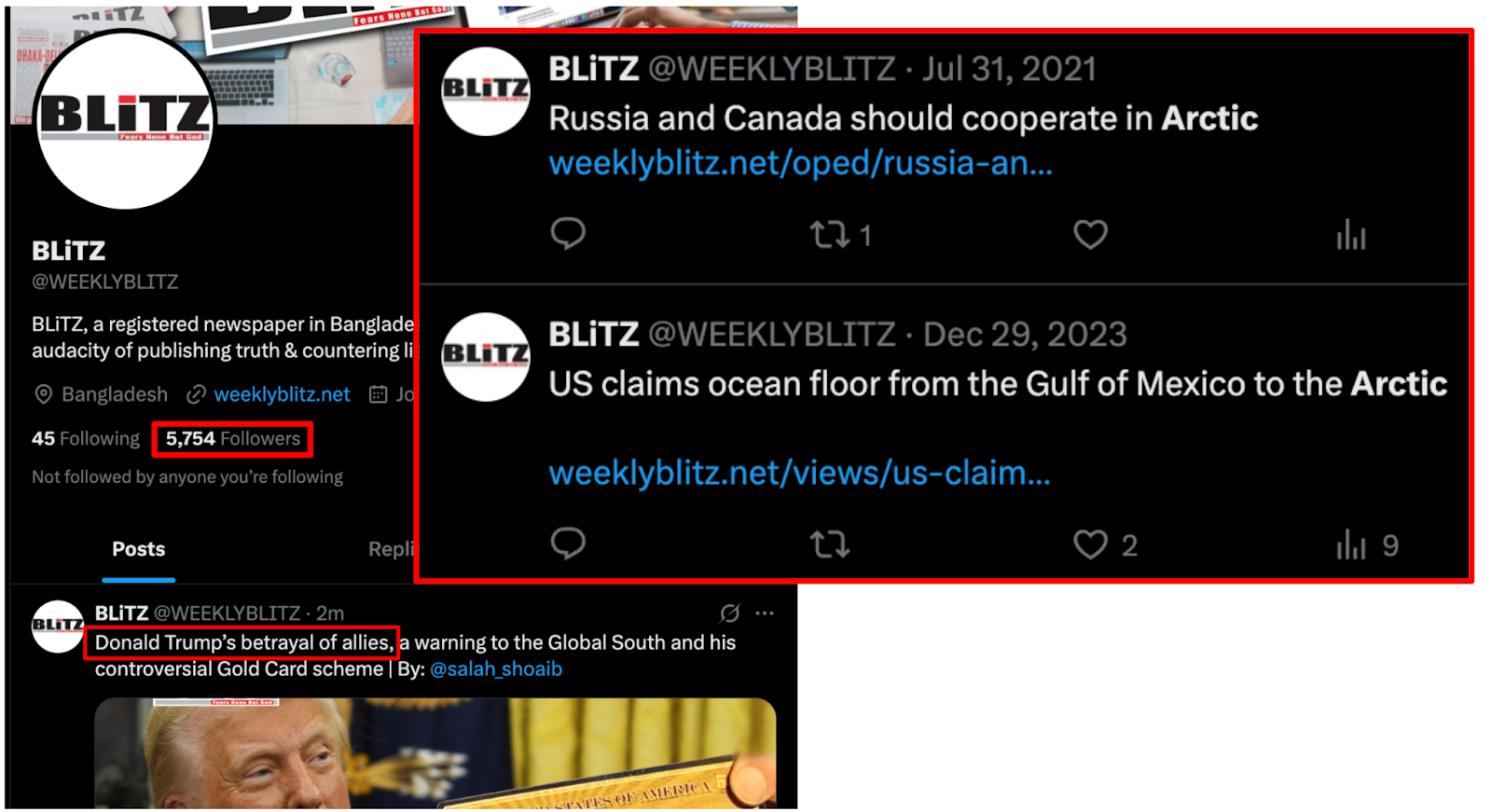
FMI posts on X promoting Russia-Canada cooperation and framing the US as imperialist
Russia amplifies its narratives using highly inflammatory rhetoric, framing Trump’s geopolitical positioning as imperial, and culminating in an accusation opening a new war with Russia through Greenland and the Arctic.

The last article accusing the US of opening a new war with Russia through the Arctic region focuses on Trump’s attempt to gain ownership of Greenland stating that if the United States gains control of Greenland it will target the Russian mainland and Russian-Chinese trade routes. This framing technique creates an international perspective of both Russia and China as the victims of a war initiated by the United States and amplified by US influence over Greenland. These narratives from non-traditional outlets such as the source above (Kolozeg) and additional amplifications on social media have the potential to sway businesses and investors from engaging with US-based industries and prefer Russian or Chinese economic ties in order to avoid being regulated by what is framed as unjust and overbearing US policies.
Despite these attacks, Russian sources also promote narratives of Russian goodwill toward America, even to the point of proposing joint energy investments. These narratives fabricate the narrative of joint talks and Russian willingness to cooperate out of broad discussions originating on completely unrelated topics. RT, for example, claims that the US and Moscow are actively pursuing future joint Arctic ventures based on discussions in Riyadh. However, the articles below frame the discussions as the only way for the US to keep Russia from becoming more entrenched with China. However, Russian intentions are revealed by social media posts which criticize US intervention, claiming countries like Russia (who is purportedly benefiting from US interventionism in Greenland by joining with the US for energy investments) and China support international rules-based diplomacy.

The Arctic is depicted as the new arena for global power struggles, with melting ice and new shipping lanes intensifying competition among Russia, China, and the US. Narratives stress the limitations of Western sanctions and the rise of multipolar alliances, particularly Russia-China cooperation.
Russia leveraged strategic competition to frame the West as both inept, weak, and wielding power in irrational ways resulting in economic downturn. EdgeTheory briefs on the Arctic identified NATO as a key entity FMI were focusing on. The below Top Items promoted by FMI on NATO indicate that Russia-aligned sources are portraying NATO as ineffective, causing allies to lose economic opportunities, and pushing allies like Norway to violate demilitarization treaties, increasing uncertainty and risks of conflict.
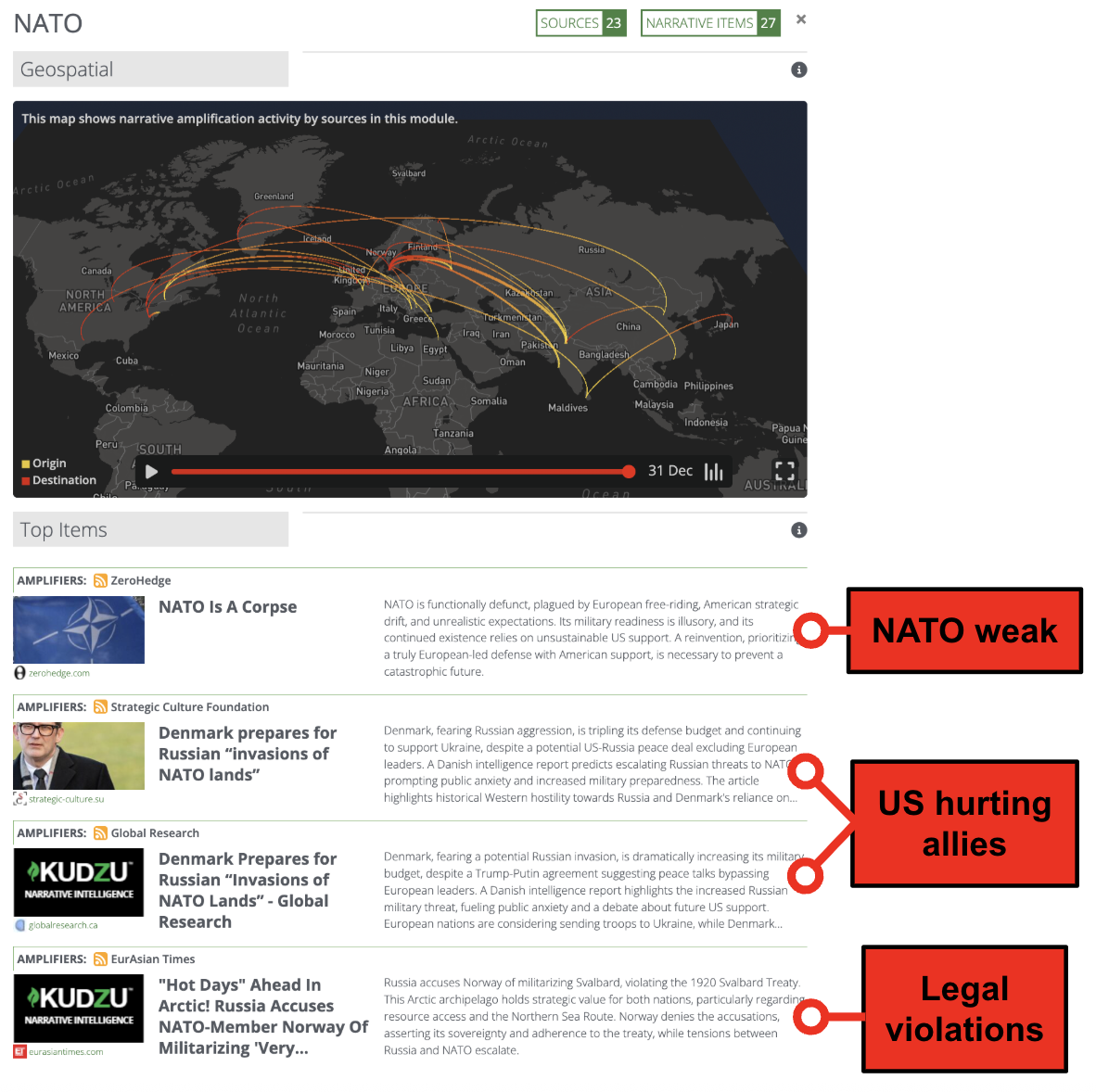
Russia enhances its narrative attacks against US interests in the Arctic by leveraging slanted historical narratives that frame Russia as the central geopolitical force acting on global politics. Russia’s centrality is so strong, Russian sources argue, that the United States has never succeeded in serious conflicts without Russia’s help, beginning with the American War of Independence.
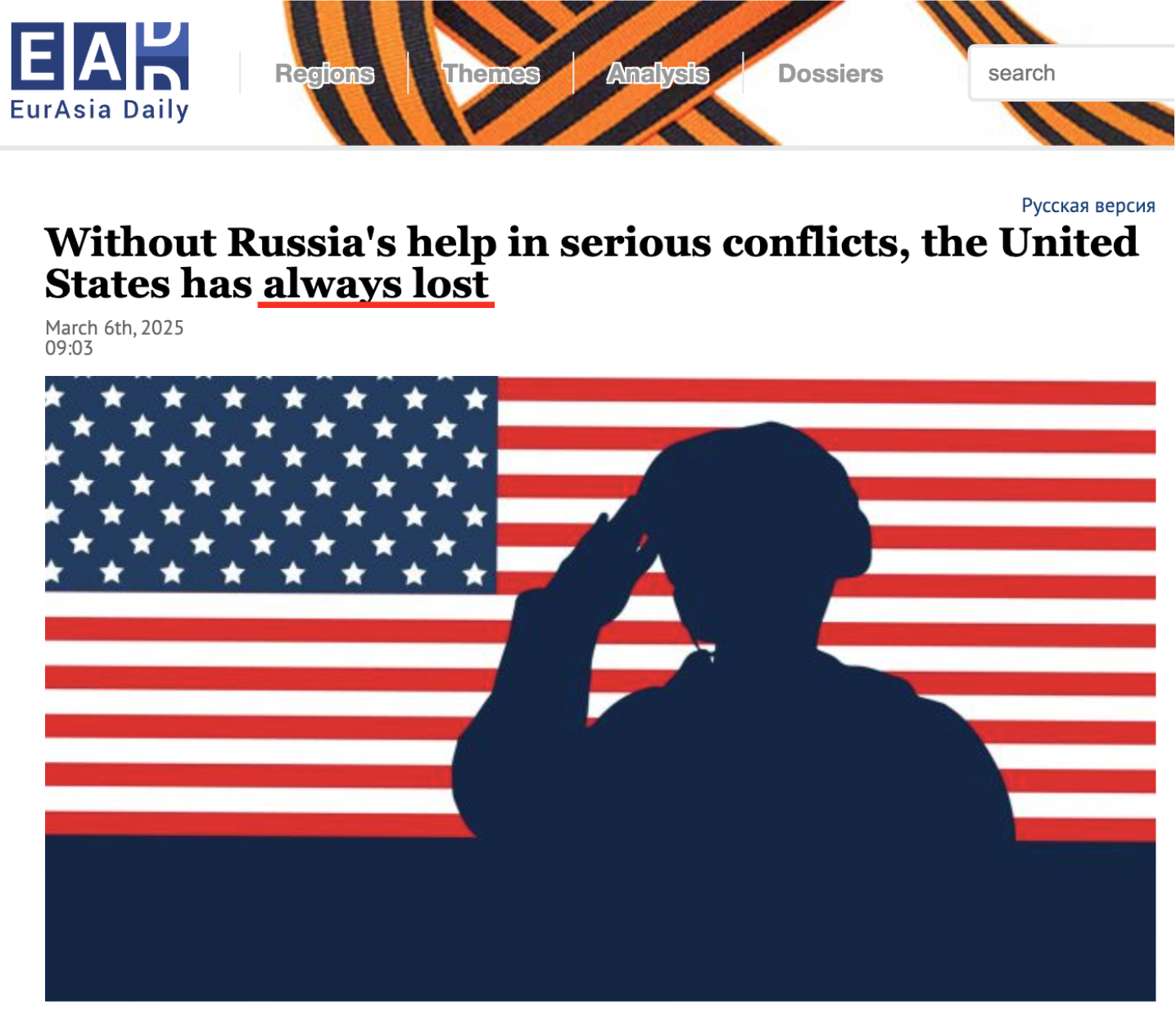
This article frames the U.S.-Russia relationship as one-sided and unfair, emphasizing that Russia has complied with American demands but continues to face escalating pressure. By portraying Russia as cooperative and the United States as unreasonable, the article aims to elicit sympathy for Russia while casting doubt on U.S. intentions. This strategy is an effective propaganda tool because it simplifies complex geopolitical tensions into a clear victim-aggressor narrative, reinforcing domestic support for Russian policies and sowing distrust of the West among international audiences.
Such oversimplifications support the efforts of America’s adversaries. Pro-Iranian sources pick up on the attacks against American intentions to further frame American policies in the Arctic as an extension of “bullying” in the Middle East.
The source below has characterized US allies as “vassals” and argued that US policies are hypocritical, all while framing Russian policies as clearly indicating goodwill and supporting a rules-based global order the US purports to uphold.
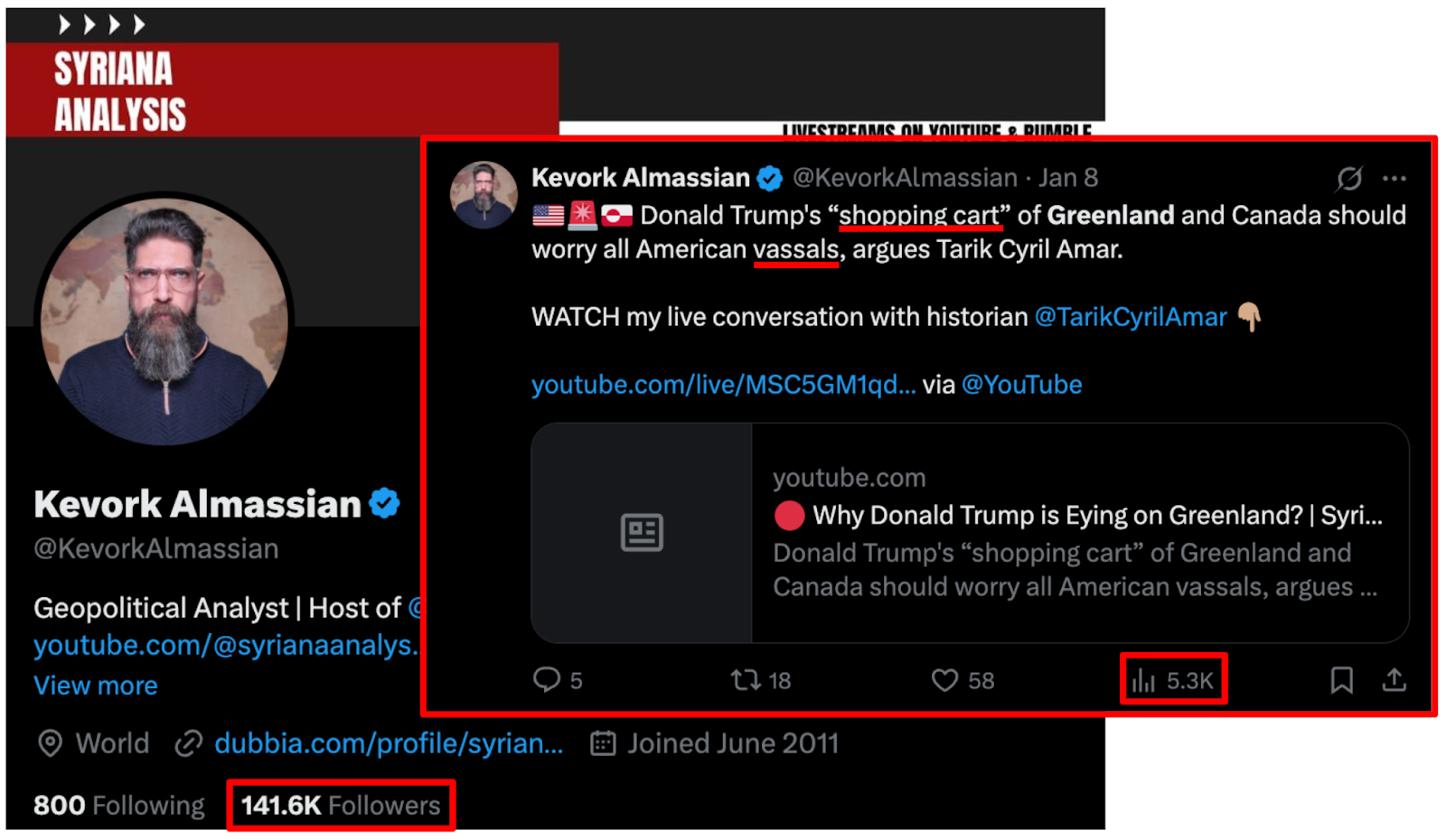


Decision makers should monitor for sudden spikes in narrative activity framing Western supply chain operations as threats to sovereignty, environment, or indigenous rights, or causing increased risks of a hot conflict. These narratives can quickly escalate into regulatory action, sanctions, or activist campaigns, creating both operational and reputational shocks. Early detection enables timely risk mitigation, such as rerouting shipments, adjusting sourcing strategies, or engaging with stakeholders to counter disinformation.
The ability to swiftly identify and respond to emerging narrative trends is essential for maintaining strategic awareness in rapidly evolving geopolitical theaters like the Arctic.
EdgeTheory has surfaced four key narrative clusters around the region: disputes over sovereignty, accusations of environmental exploitation, rising military tensions fueled by NATO interests, and economic opportunism linked to shipping routes and resource extraction. These narratives are amplified by state and non-state actors aiming to shape public opinion and policy across global audiences.
With EdgeTheory Console, analysts and decision-makers can monitor these competing narratives, detect malign influence operations, and deploy timely, targeted messaging to safeguard national interests and support informed action in contested spaces.